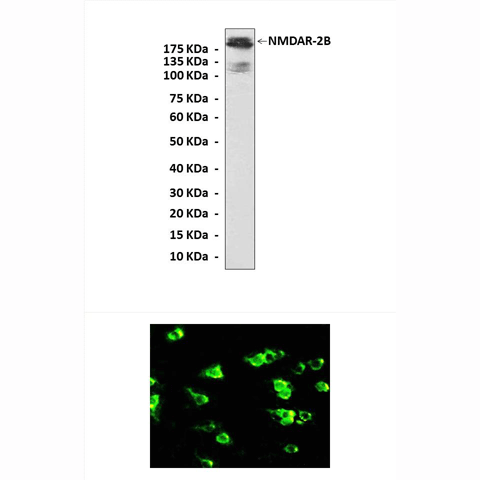Product Sheet CA1059
Description
BACKGROUND Glutamate is a major excitatory neurotransmitter in the central nervous system. Glutamate receptors are divided into two types of receptors, ionotropic receptors and metabotropic receptors, based on their structural and functional properties. N-Methyl-D-aspartate (NMDA) receptors, which belong to the family of ionotropic glutamate receptors, which also includes Kainate and AMPA receptors. They are implicated in synaptic plasticity, synaptogenesis, and excitotoxicity. NMDA receptors consist of NR1 subunits combined with one or more NR2 (A-D) or NR3 (A-B) subunits. Cell-specific factors are thought to control expression of different isoforms, possibly contributing to the functional diversity of the subunits. The NMDAR channel is highly permeable to Ca2+ and Na+, and its opening requires simultaneous binding of glutamate and postsynaptic membrane depolarization. Once activated, the NMDAR channel allows calcium influx into the postsynaptic cell where calcium triggers a cascade of biochemical events resulting in synaptic changes, where it activates several signaling cascades, including pathways leading to the induction of long-term potentiation (LTP) and depression (LTD).1 At resting membrane potentials NMDA receptors are inactive due to a voltage-dependent blockade of the channel pore by Mg2+. They govern a range of physiological conditions including neurological disorders caused by excitotoxic neuronal injury, psychiatric disorders and neuropathic pain syndromes.
Both types of subunits have a large COOH-terminal intracellular domain, suggesting that the large cytoplasmic domain may directly interact with proteins that regulate NMDA receptor function. For example, it was suggested that postsynaptic density protein PSD95 directly interacts with NMDA receptors, although the biological significance of the interaction has not been established. The intracellular domain of NR1, NR2A, and NR2B contains serine residues that can be phosphorylated by protein kinases. Protein kinase C (PKC) phosphorylates serine residues 889, 890, and 896 within the C1 exon of the NR1 subunit; protein kinase A (PKA) phosphorylates serine residue 897. PKC can directly phosphorylate S1303 and S1323 in the NR2B C terminus, leading to enhanced currents through NMDA receptor channels.2 Protein phosphatase 1 and protein phosphatase 2A dephosphorylate phospho-Ser1303 on NR2B.3 The NMDA receptor-mediated current is regulated by several protein kinases and phosphatases. In addition, CaM binds to NR1 in a Ca2+-dependent manner and that the binding inactivates NMDA channels. This feedback system regulates the amount of Ca2+ influx through the NMDA receptors. PKC-mediated phosphorylation on serine residues of NR1 decreases its CaM binding affinity and prevents inactivation of NMDA channels by Ca2+.4
Both types of subunits have a large COOH-terminal intracellular domain, suggesting that the large cytoplasmic domain may directly interact with proteins that regulate NMDA receptor function. For example, it was suggested that postsynaptic density protein PSD95 directly interacts with NMDA receptors, although the biological significance of the interaction has not been established. The intracellular domain of NR1, NR2A, and NR2B contains serine residues that can be phosphorylated by protein kinases. Protein kinase C (PKC) phosphorylates serine residues 889, 890, and 896 within the C1 exon of the NR1 subunit; protein kinase A (PKA) phosphorylates serine residue 897. PKC can directly phosphorylate S1303 and S1323 in the NR2B C terminus, leading to enhanced currents through NMDA receptor channels.2 Protein phosphatase 1 and protein phosphatase 2A dephosphorylate phospho-Ser1303 on NR2B.3 The NMDA receptor-mediated current is regulated by several protein kinases and phosphatases. In addition, CaM binds to NR1 in a Ca2+-dependent manner and that the binding inactivates NMDA channels. This feedback system regulates the amount of Ca2+ influx through the NMDA receptors. PKC-mediated phosphorylation on serine residues of NR1 decreases its CaM binding affinity and prevents inactivation of NMDA channels by Ca2+.4
REFERENCES
1. Xia, S. et al: Curr. Biol. 15:603-15, 2005
2. Liao, G.Y. et al: Mol. Pharmacol. 59:960-4, 2001
3. Raveendran, R. et al: J. Neurosci. 110:92-105, 2009
4. Hisatsune, C. et al: J. Biol. Chem. 272:20805-10, 1997
2. Liao, G.Y. et al: Mol. Pharmacol. 59:960-4, 2001
3. Raveendran, R. et al: J. Neurosci. 110:92-105, 2009
4. Hisatsune, C. et al: J. Biol. Chem. 272:20805-10, 1997
Products are for research use only. They are not intended for human, animal, or diagnostic applications.
Details
Cat.No.: | CA1059 |
Antigen: | Short peptide from human NMDAR-2B sequence. |
Isotype: | Rabbit IgG |
Species & predicted species cross- reactivity ( ): | Human, Rat |
Applications & Suggested starting dilutions:* | WB 1:1000 IP n/d IHC 1:50 - 1:200 ICC n/d FACS n/d |
Predicted Molecular Weight of protein: | 180 kDa |
Specificity/Sensitivity: | Detects endogenous levels of NMDAR-2B proteins without cross-reactivity with other related proteins. |
Storage: | Store at -20°C, 4°C for frequent use. Avoid repeated freeze-thaw cycles. |
*Optimal working dilutions must be determined by end user.
Products
| Product | Size | CAT.# | Price | Quantity |
|---|---|---|---|---|
| Rabbit N-Methyl-D-Aspartate Receptor 2B Antibody : Rabbit N-Methyl-D-Aspartate Receptor 2B Antibody | Size: 100 ul | CAT.#: CA1059 | Price: $375.00 |

